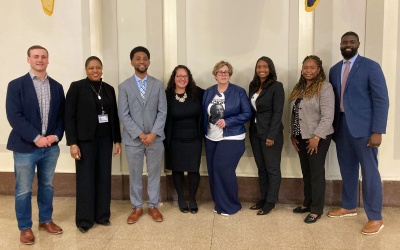April 2022
As Faith Leach puts it: Children can be the collateral damage of incarceration.

From left, Brendon Frankel, Kimberly Lagree, Mayor Brandon Scott, Margo Candelaria, Kimberly Haven, Deputy Mayor Faith Leach, Tracy Estep, and Wesley Dawson.
The Baltimore deputy mayor of equity, health, and human services was one of those children herself, as both of her parents were incarcerated for most of her childhood.
Her father died while behind bars, and her mother, Katie Leach, was in and out of prisons until Faith was 16. Despite the challenges, her mother remained connected to her children beyond visiting hours.
“She called, she wrote, and she sent photos when my siblings visited, all to maintain the familial bond,” said Faith Leach, who is also the interim executive director of the Baltimore City Mayor’s Office of Children and Family Success.
Re-entry programs helped Katie Leach, who later worked for the same program. In 2019, she earned her master’s degree in social work.
While Katie Leach’s maternal instinct and a bond were there to support her daughter, it may not be as easy for all incarcerated parents. A new Baltimore City program hopes to change that.
B’More Reconnects will help incarcerated and recently released parents prepare to be an involved mom or dad while reducing trauma for children, thanks to a three-year, $1.5 million grant from the U.S. Department of Justice through the 2008 Second Chance Act to reduce recidivism. About 400 parents will receive proven, research-based parenting education in Baltimore City detention centers as well as upon re-entry.
“After my mom was released, we began to rebuild our relationship. We began to reconnect,” Faith Leach said during an April 6 news conference to announce the program. “Today she is not only my mother, she is my friend and the most inspirational human in my entire life.”
The Institute for Innovation and Implementation (The Institute) at the University of Maryland School of Social Work (UMSSW) will provide project management and evaluation.
“We are very excited to work on a project that will make a difference in the lives of children and families in Baltimore City,” said Margo Candelaria, PhD, MSW, research associate professor at UMSSW and co-director of the Parent, Infant, and Early Childhood Program at The Institute.
Kate Sweeney, MSW, co-director of Parent, Infant, and Early Childhood at The Institute, will serve as project director for B’More Reconnects.
B’More Reconnects will provide parenting skill development for parents to address the needs of their children and training for correctional officers to respond to the needs of parents, children, and families during visitation. It also will examine visitation policies at Baltimore City correctional facilities and support community-based services to meet the needs of parents and the whole family upon re-entry.
“This program will prepare families after incarceration by investing in the coordination of services for these parents upon re-entry including educational and vocational support, health care, housing, and parental support,” Baltimore Mayor Brandon M. Scott said.
Within Baltimore, an estimated 20,000 children have a parent who is incarcerated or on parole/probation. Nationally, more than half of women in prisons are parents, and 80 percent of women in local jails are mothers, according to the federal Bureau of Justice Statistics. The program will initially be focused on assisting incarcerated mothers and mothers on parole or probation, and work to expand the program to fathers.
B’More Reconnects focuses on providing services to parents six months before release and continues when they return home.
“By working with parents in the months before community re-entry and as they’re re-entering their community, B’more Reconnects will prepare them to have improved relationships with their children, which helps our cities’ children,” Candelaria said. “Incarcerated adults are often parents, and if we support them to be successful citizens, we need to also acknowledge that they’re also parents.”
The Baltimore City Mayor’s Office of Children and Family Success is the lead agency, and partner organizations include the Maryland Department of Public Safety and Correctional Services, which will identify and facilitate training for caregivers and correctional officers; PIVOT, which will conduct parenting intervention groups for incarcerated parents and to caregivers within the community; and the Baltimore City Health Department, which will provide trauma-informed training for correctional officers to improve visitation policies and practices.
Kimberly Haven, executive director of Reproductive Justice Inside, will provide subject matter expertise on visitation policy and its impact on children. Haven was an incarcerated parent of a child.
“Just because somebody is incarcerated does not mean they don’t want to be a good parent,” Haven said. “It does not mean that they leave their parenting responsibilities, their anxiousness about what’s going on with their children when they’re behind the fence.”
She has seen mothers skip dinner just to get to the telephone to help their children with homework or read a bedtime story.
One opportunity to improve the experience is to help parents be truthful with their children, she said, and have authentic interactions. Haven has heard mothers explain to their kids that they went to college or into the Army when they were incarcerated.
“Let’s prepare people to be parents when they come home to their children. Prison is not normal. It’s not supposed to be normal,” Haven said. “How do we take an abnormal situation, and how do we put the supports in place so that moms are reading to their kids, dads are reading to their kids? That we’re also engaging authentically about what we tell our children?”
Federal funds for B’More Reconnects were made impactful through matching dollars from three Baltimore-based foundations: The Wright Family Foundation, The Richman Family Foundation, and The Zanvyl and Isabelle Krieger Fund.
Search UMB News
Sign up for UMB Alerts.



